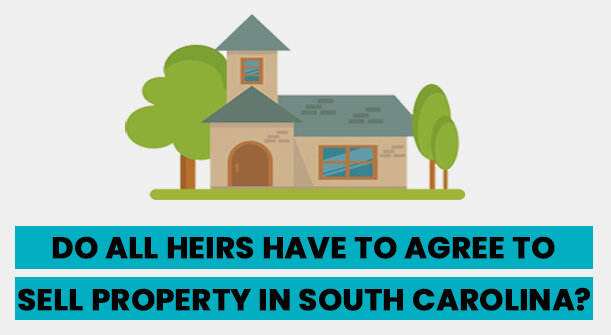
Inheriting property can be a complex and emotionally charged process, especially when multiple heirs are involved. In South Carolina, as in many other states, the question of whether all heirs must agree to sell inherited property is a common concern.
The answer isn’t always straightforward and can depend on various factors, including the specifics of the will, the type of property ownership, and the relationships among the heirs.
Navigating the intricacies of property inheritance and sale in South Carolina requires a clear understanding of state laws, probate procedures, and the rights of all parties involved. Whether you’re an heir looking to sell your share of an inherited property or trying to reach an agreement with co-heirs, it’s crucial to be well-informed about your options and potential challenges.
Inheritance and Property Rights Laws in South Carolina
There are several statutes that dictate how inheritance and property rights are carried when you sell your inheritance house during probate in South Carolina.
- South Carolina Code of Laws, Title 62 – South Carolina Probate Code: This is the main body of laws governing probate, wills, and estate administration in South Carolina.
- S.C. Code Ann. § 62-2-101 to 62-2-114 – Intestate Succession: These statutes outline how property is distributed when a person dies without a valid will in South Carolina.
- S.C. Code Ann. § 62-3-701 to 62-3-721 – Probate of Wills and Administration: These laws detail the process of proving a will’s validity and administering an estate in South Carolina.
- S.C. Code Ann. § 62-3-901 to 62-3-911 – Distribution and Closing of Estate: These statutes govern how assets are distributed to heirs and beneficiaries and the procedures for closing an estate in South Carolina.
- S.C. Code Ann. § 15-61-10 to 15-61-110 – Partition of Real Estate: These laws outline the legal process for dividing jointly owned real estate among multiple owners in South Carolina.
2 Types of Property Ownership After Inheritance
When inheriting property in South Carolina, you’ll typically encounter two main types of ownership: tenancy in common and joint tenancy. Understanding these can help you navigate your rights and responsibilities as an heir.
Tenancy in Common
In common tenancy, each heir owns a distinct share of the property. You can sell, lease, or share your share without the consent of other owners. However, you can’t sell the entire property without agreement from all co-tenants. This arrangement is common when multiple heirs inherit a property.
Joint Tenancy
Joint tenancy involves equal ownership with the right of survivorship. If one owner dies, their share automatically transfers to the surviving owners. You’ll need agreement from all joint tenants to sell the property. This type of ownership is less common in inheritance situations but can occur in certain circumstances.
What Is the Role of a Will or Trust in Property Distribution During Probate?
A will or trust plays a crucial role in property distribution during probate in South Carolina. These legal documents outline the deceased’s wishes regarding how their assets, including real estate, should be distributed among heirs. A well-drafted will or trust can provide clear instructions, potentially avoiding disputes among heirs.
During probate, the court uses the will as a guide to distribute assets. If there’s a trust, it may bypass probate altogether, streamlining the process. However, even with a will or trust, complications can arise if the instructions are unclear or if heirs disagree with the terms. In such cases, the probate court may need to intervene to resolve disputes.
The General Rule: Unanimous Agreement
Unanimous agreement among heirs is typically required to sell inherited property in South Carolina. This rule exists to protect the interests of all heirs and ensure that no one’s inheritance rights are unfairly compromised. When all heirs agree, it simplifies the selling process and reduces the likelihood of legal disputes.
However, requiring unanimous agreement can also lead to complications. If even one heir refuses to sell or can’t be reached, it can stall the entire process. This situation often leads to frustration among other heirs who may need to sell for financial reasons or simply wish to move on. In such cases, you may need to explore alternative options or legal remedies to proceed with the sale.
Scenarios Where Not All Heirs Need to Agree
While unanimous agreement is the general rule, there are exceptions. Here are some scenarios where you might be able to sell inherited property without all heirs agreeing:
- When the will grants selling power to the executor: The deceased may have given the executor authority to sell property without their consent.
- Probate court intervention: If selling is in the estate’s best interest, a court may approve a sale despite objections.
- Buyout agreements among heirs: Some heirs may agree to buy out others’ shares, allowing for a partial sale.
- Partition lawsuits: As a last resort, you can file a lawsuit to force the sale of the property.
The Process of Selling Inherited Property During Probate in South Carolina
When selling your inherited house in South Carolina, the probate process includes these steps:
- Appoint an executor or administrator: The court will appoint someone to manage the estate and handle the sale.
- Get the property appraised: Determine the fair market value of the property to set an appropriate asking price.
- File a petition with the probate court: Seek permission to sell the property if required by the will or circumstances.
- List and market the property: Work with a real estate agent to list and show the property to potential buyers.
- Close the sale: Once you have a buyer, complete the sale and distribute proceeds according to the will or state law.
Here’s What Happens if You Sell Your Inherited House Without an Agreement
Selling an inherited house without agreement from all heirs can lead to serious legal consequences. You may face lawsuits from the dissenting heirs, claiming their property rights were violated. This could result in the sale being invalidated by the court, forcing you to return the property or compensate the buyers.
You might be held personally liable for any financial losses incurred by other heirs or the buyers. This could include legal fees, the difference in property value if prices have increased, and potential punitive damages. It’s crucial to ensure you have proper authority or agreement before proceeding with a sale to avoid these risks.
Strategies for Reaching Agreement Among Heirs
When dealing with inherited property, reaching an agreement among heirs can be challenging. Here are some strategies that can help:
Open Communication
Encourage open and honest discussions among all heirs. Share your thoughts, concerns, and goals regarding the property. Listen to others’ perspectives and try to understand their positions. This can help identify common ground and potential solutions that work for everyone.
Mediation
Consider hiring a professional mediator to facilitate discussions. A neutral third party can help manage emotions, ensure everyone’s voice is heard, and guide the group towards a mutually acceptable solution. Mediation can be less costly and time-consuming than legal battles.
Buyout Options
Explore the possibility of some heirs buying out others’ shares. This can satisfy those who want to keep the property and those who prefer cash. Determine a fair price based on professional appraisals and negotiate terms that work for all parties involved.
Compromise Solutions
Look for creative solutions that address everyone’s needs. For example, you might agree to sell the property but delay the sale for a set period, or arrange for some heirs to rent the property from others. Be open to unconventional ideas that could satisfy all parties.
What Is the Best Way to Sell My Inherited House Fast During Probate?
A cash home sale is often the best way to sell an inherited house quickly during probate. In this type of sale, you sell directly to a buyer who has the funds to purchase the property outright, without needing a mortgage or other financing. This can significantly speed up the selling process, which is particularly beneficial when dealing with inherited property.
Cash home sales offer several advantages in probate situations. They typically involve fewer contingencies and can close much faster than traditional sales. This can be crucial when you need to settle the estate quickly or when multiple heirs are eager to receive their share of the inheritance. Additionally, cash buyers often purchase properties “as-is,” eliminating the need for repairs or renovations that could delay the sale.
5 Frequently Asked Questions About Probate in South Carolina
How long does probate take in South Carolina?
Typically, probate in South Carolina takes 6-12 months, but complex estates can take longer.
Can an executor sell property without all beneficiaries approving in South Carolina?
Generally, an executor needs all beneficiaries’ approval unless the will grants them specific authority to sell.
What happens if an heir refuses to sign probate papers in South Carolina?
The court can proceed without their signature, but it may cause delays and complications.
How are debts handled during probate in South Carolina?
Debts are paid from the estate before assets are distributed to heirs.
Can you avoid probate in South Carolina?
Yes, through methods like living trusts, joint ownership, and payable-on-death accounts.
Get Cash for My Home in South Carolina
If you need to sell your house fast but don’t want the hassle of a traditional home sale, contact Peak Home Buyers. We buy houses as-is. No repairs are needed. Avoid closing costs and realtor commissions. Close in as little as seven days. Call 385-355-1807 to get cash for your home from our local home buyers in South Carolina.
